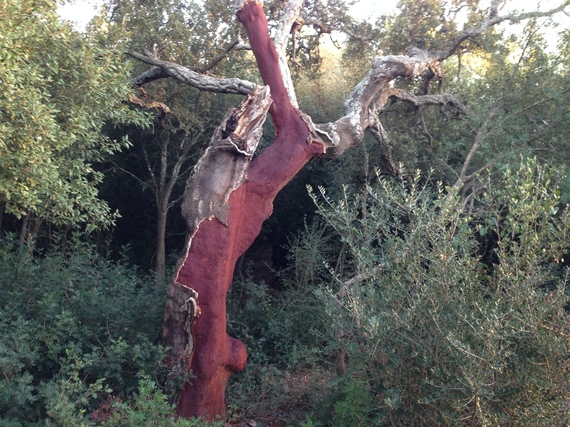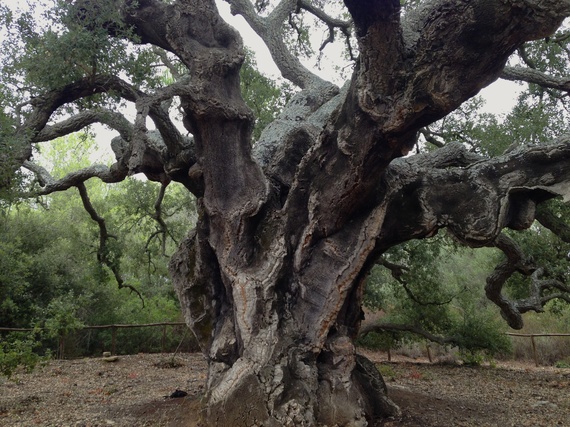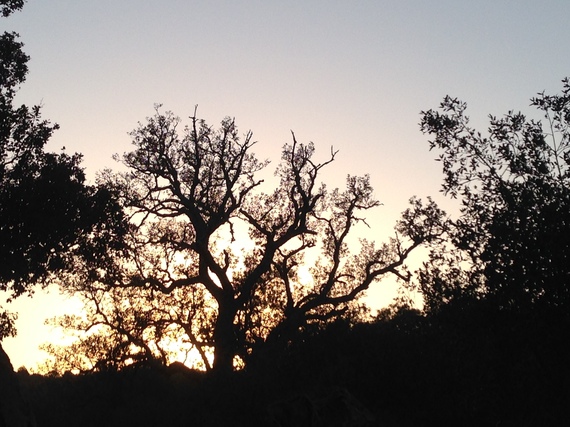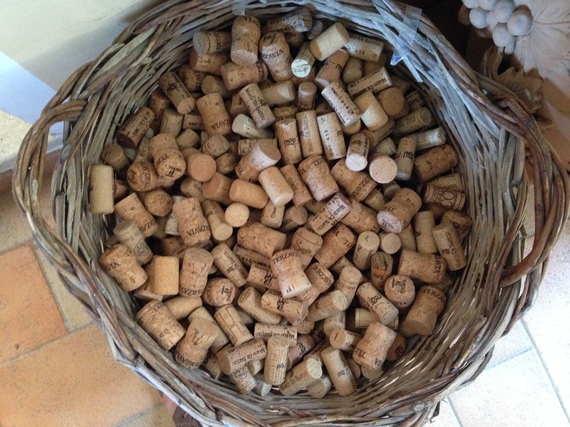TRUE!
Read on for 5 Green Benefits...
(And practical, cultural and community advantages, too. )
Did you know that Cork stoppers are made by stripping bark from Cork Oaks? Here is a tree that was recently stripped in the San Pietro Forest in Southern Sicily (Italy).
Cork oaks (Quercus Suber) only grow in the western Mediterranean (Portugal, Spain, Italy, Tunisia, Algeria, Morocco and France) and typically live 250-300 years. Here's an ancient one in all its twisted Treebeard beauty.
After 25 years, cork oaks can be harvested. The bark (cork) is stripped by hand (no mechanical alternative) every nine-to-12 years. The tree then regenerates another layer of cork/bark. Watch the video.
What are the Green Benefits of buying wine bottles with cork stoppers?
1) Use a Clean, Renewable Resource
Cork is infinitely renewable. Harvesting doesn't harm the trees, and it's easy to create more supply by planting more trees (which in turn has benefits listed below.) Producing metal screw caps and plastic stoppers requires more non-renewable energy (10 times more for a screw cap) and creates toxic by-products especially from petrochemicals (plastic stoppers).
2) Prevent Land Erosion and Desertification
In the past ten years, cork's share of the market has declined from 95% to 70% (source: LA Times) forcing cork prices down and making it hard for producers to recoup harvesting costs. Consequently, growers have been selling off their cork forests. Much like in the Amazon Rain Forest, the new owners, farmers or industrialists, cut down the trees. The fastest way to reverse this downward spiral is to buy cork.
4) Reduce Greenhouse Gases (and Slow Climate Change)
This is a double plus.
First, making a cork creates 24 times less greenhouse gas than producing a metal screw cap. (source: Cork Forest Alliance)
Second, Cork trees (like all trees) absorb millions of tons of greenhouse gases, and cork trees that are being harvested actually absorb 3-5 times more greenhouse gases. (source: 100% Cork)
5) Preserve Unique and Diverse Eco-Systems
Cork forests are home to many endangered species and to a splendid diversity of plant, animal, bird and insect life. Cutting down the forest destroys unique treasure that cannot be replaced.
3) Corks are biodegradable and recyclable.
Unlike other stoppers, cork is biodegradable and recyclable. All Whole Foods Stores recycle corks. Check for other locations.
What are the other benefits?
1) Allow your wine to breathe.
The porous nature of cork allows a tiny transfer of oxygen between the wine and the outside air. This is one factor that mellows wine over time by softening the natural tannins. Glass, plastic, and most screw caps seal the bottle tightly. There is now new technology for breathable metal corks, which may be the final blow to natural cork unless people understand its full benefits.
2) Preserve Communities and Artisan Jobs
There is no way to harvest cork mechanically. The hand harvesting requires artisanal knowledge passed down through generations. Demand for cork creates/maintains artisan jobs and preserves the fabric of centuries old communities, primarily in rural Portugal.
3) Ritual, Tradition and Romance
No other stopper can compete with cork in terms of ritual, tradition and romance. Drinking a bottle of wine is an experience that connects people across time and space. Cork is an integral part of that experience.
4) A vote for beauty
Cork trees are magnificent and a cork forest is a thing of beauty. I took this photo at sunset in San Pietro.
The only disadvantages to cork stoppers are that they cost slightly more (although not when you compare "full costs"), that they aren't good for re-closing a bottle, and that occasionally cork is tainted a chemical called TCA that gives wine a moldy, musty smell. (Cork producers are now checking for the chemical and claim to have reduced the number of so-called "corked" bottles to less than one percent of the total output.)




